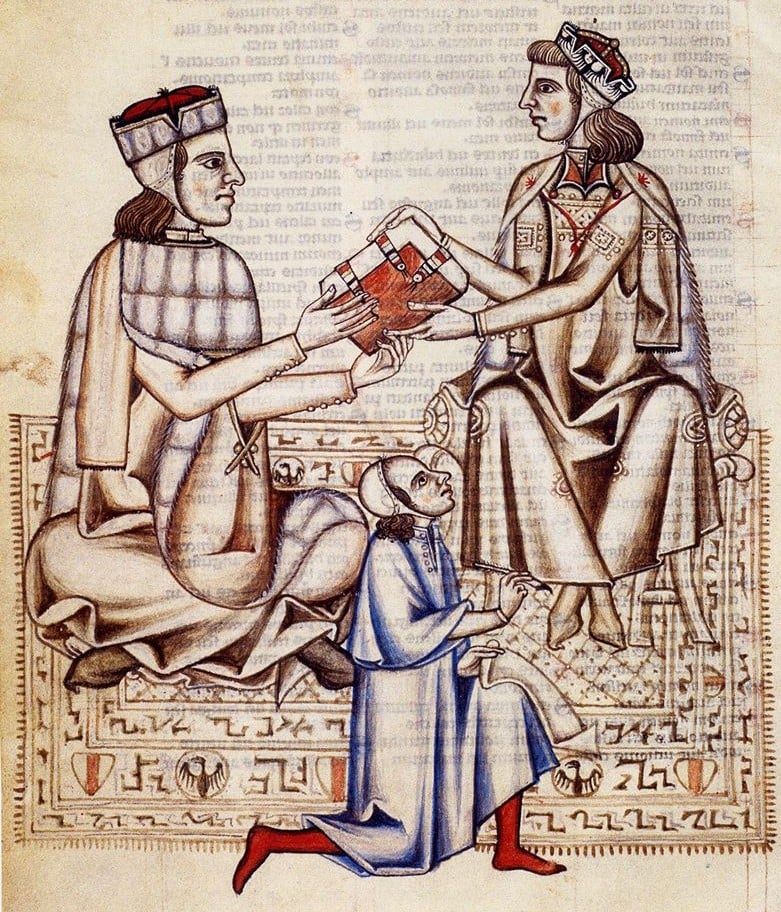Manfredi of Sicily
| Manfred | |
|---|---|

13th-century depiction of writer Johensis presenting Manfred with the Bibbia di Manfredi
|
|
| King of Sicily | |
| Reign | 1258–1266 |
| Coronation | 10 August 1258 |
| Predecessor | Conradin |
| Successor | Charles I |
| Born | 1232 Venosa, Kingdom of Sicily |
| Died | 26 February 1266 (killed in battle, aged 34) Benevento, Kingdom of Sicily |
| Spouse |
Beatrice of Savoy Helena Angelina Doukaina |
| Issue | Constance, Queen of Sicily |
| House | House of Hohenstaufen |
| Father | Frederick II, Holy Roman Emperor |
| Mother | Bianca Lancia |
Manfred (Sicilian: Manfredi di Sicilia; 1232 – 26 February 1266) was the King of Sicily from 1258 to 1266. He was an illegitimate son of the emperor Frederick II of Hohenstaufen, but his mother, Bianca Lancia (or Lanzia), is reported by Matthew Paris to have been married to the emperor while on her deathbed.
Manfred was born in Venosa. Frederick II appears to have regarded him as legitimate, and by his will named him as Prince of Taranto and appointed him as the representative in Italy of his half-brother, the German king, Conrad IV. Manfred, who initially bore his mother's surname, studied in Paris and Bologna and shared with his father a love of poetry and science.
At Frederick's death, Manfred, although only about 18 years old, acted loyally and with vigour in the execution of his trust. The Kingdom was in turmoil, mainly due to riots spurred by Pope Innocent IV. Manfred was able to subdue numerous rebel cities, with the exception of Naples. When his legitimate brother Conrad IV appeared in southern Italy in 1252, disembarking at Siponto, his authority was quickly and generally acknowledged. Naples fell in October 1253 into the hands of Conrad. The latter, in the meantime, had grown distrustful of Manfred, stripping him of all his fiefs and reducing his authority to the principality of Taranto.
In May 1254 Conrad died of malaria. Manfred, after refusing to surrender Sicily to Innocent IV, accepted the regency on behalf of Conradin, the infant son of Conrad. The pope however, having been named guardian of Conradin, excommunicated Manfred in July 1254. The regent decided to open negotiations with Innocent. By a treaty made in September 1254, Apulia passed under the authority of the pope, who was personally conducted by Manfred into his new possession. But Manfred’s suspicions being aroused by the demeanour of the papal retinue, and also annoyed by the occupation of Campania by papal troops, he fled to the Saracens at Lucera. Aided by Saracen allies, he defeated the papal army at Foggia on 2 December 1254, and soon established his authority over Sicily and the Sicilian possessions on the mainland. In that year Manfred supported the Ghibelline communes in Tuscany, in particular Siena, to which he provided a corps of German knights that was later instrumental in the defeat of Florence at the Battle of Montaperti. He thus reached the status of patron of the Ghibelline League. Also in that year Innocent died, succeeded by Alexander IV, who immediately excommunicated Manfred. In 1257, however, Manfred crushed the papal army and settled all the rebellions, imposing his firm rule of southern Italy and receiving the title of vicar from Conradin.
...
Wikipedia
